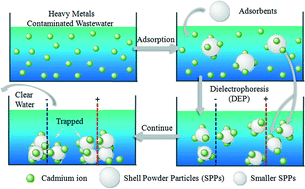A dielectrophoresis-assisted adsorption approach significantly facilitates the removal of cadmium species from wastewater
Abstract
A newly designed apparatus and process, including dielectrophoresis and adsorption to efficiently remove cadmium species from wastewater, is reported in this study. With this technique, cadmium ions are firstly adsorbed by shell powder particles, which are subsequently trapped and concentrated by a dielectrophoresis process. The factors affecting the metal removal efficiency are systematically investigated, which allows us to determine the optimal operation conditions. Our experimental data indicate that via the adsorption and dielectrophoresis steps, cadmium can be almost completely removed from wastewater as evidenced by the very high removal efficiency of 99.4%. This suggests that our dielectrophoresis-assisted adsorption approach is highly effective for the removal of cadmium, and the technique could be extended to the removal of other heavy metal ions from wastewater as well.


 Please wait while we load your content...
Please wait while we load your content...